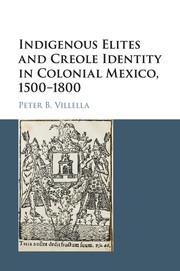Crossref Citations
This Book has been
cited by the following publications. This list is generated based on data provided by Crossref.
Villella, Peter B.
2016.
“For So Long the Memories of Men Cannot Contradict It”: Nahua Patrimonial Restorationism and the Law in Early New Spain.
Ethnohistory,
Vol. 63,
Issue. 4,
p.
697.
2017.
The Lords of Tetzcoco.
p.
197.
Pollnitz, Aysha
2017.
OLD WORDS AND THE NEW WORLD: LIBERAL EDUCATION AND THE FRANCISCANS IN NEW SPAIN, 1536–1601The Whitfield Prize Winner.
Transactions of the Royal Historical Society,
Vol. 27,
Issue. ,
p.
123.
Gharala, Norah L. A.
2018.
“Not even blood mixture could make them unworthy”: political loyalty and tribute in Bourbon New Spain.
Journal of Iberian and Latin American Studies,
Vol. 24,
Issue. 2,
p.
195.
McManus, Stuart M.
and
Leibsohn, Dana
2018.
Eloquence and ethnohistory: indigenous loyalty and the making of a Tagalogletrado.
Colonial Latin American Review,
Vol. 27,
Issue. 4,
p.
522.
McManus, Stuart M.
2018.
The Bibliotheca Mexicana Controversy and Creole Patriotism in Early Modern Mexico.
Hispanic American Historical Review,
Vol. 98,
Issue. 1,
p.
1.
McManus, Stuart M.
2018.
7 The Exemplary Power of Antiquity: Humanist Rhetoric and Ceremony in Seventeenth‐Century New Spain.
Bulletin of Latin American Research,
Vol. 37,
Issue. S1,
p.
104.
2019.
The Making of Japanese Settler Colonialism.
p.
237.
2019.
The Making of Japanese Settler Colonialism.
p.
263.
2019.
The Making of Japanese Settler Colonialism.
p.
126.
2019.
The Making of Japanese Settler Colonialism.
p.
275.
2019.
The Making of Japanese Settler Colonialism.
p.
183.
2019.
The Making of Japanese Settler Colonialism.
p.
206.
Amaral-Rodríguez, Jannette
2019.
Tlaxcala’s ‘redondez’ and the making of new worlds: from global empire to Indian province inDescripción de la ciudad y provincia de Tlaxcala(1581–1585).
Colonial Latin American Review,
Vol. 28,
Issue. 2,
p.
152.
Lu, Sidney Xu
2019.
The Making of Japanese Settler Colonialism.
García Loaeza, Pablo
2019.
The Transcoding of the Codex Xolotl in Don Fernando de Alva Ixtlilxochitl’s Historia de la nación chichimeca
.
Ethnohistory,
Vol. 66,
Issue. 1,
p.
71.
Cunill, Caroline
2019.
La protectoría de indios en América: avances y perspectivas entre historia e historiografía.
Colonial Latin American Review,
Vol. 28,
Issue. 4,
p.
478.
Dyck, Jason
2019.
Bastions of the Virgin: Francisco de Florencia’s Marian cartography of Mexico City.
Colonial Latin American Review,
Vol. 28,
Issue. 3,
p.
336.
2019.
The Making of Japanese Settler Colonialism.
p.
295.
2019.
The Making of Japanese Settler Colonialism.
p.
69.





